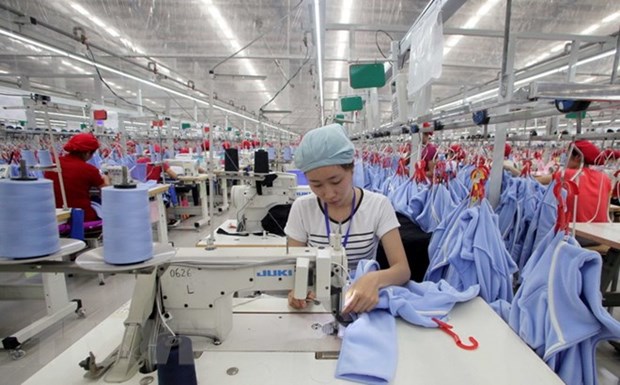Enhanced capacity of govt, enterprises needed to translate CPTPP into success
Mechanisms must be established to enhance the capacity of both the Government and local enterprises so that the CPTPP can be a success, said Chairman of the VCCI Vu Tien Loc.
 A factory of the Tinh Loi Garment Co. Ltd in the Lai Vu Industrial Park in Kim Thanh district, Hai Duong province (Photo: VNA)
A factory of the Tinh Loi Garment Co. Ltd in the Lai Vu Industrial Park in Kim Thanh district, Hai Duong province (Photo: VNA)Hanoi (VNA) – Mechanisms must be established to enhance the capacity of both the Government and local enterprises so that the Comprehensive and Progressive Agreement for Trans-Pacific Partnership (CPTPP) can be a resounding success, said Chairman of the Vietnam Chamber of Commerce and Industry (VCCI) Vu Tien Loc.
His statement was made after the 14th National Assembly approved a resolution ratifying the CPTPP and related documents with 96.7 percent of the vote on November 12.
Loc shared the view of many NA deputies in that it is vital to develop an action programme that can outline an effective roadmap and implement the trade deal.
The action programme must develop all possible scenarios to take the initiative in the fulfillment of CPTPP commitments and, at the same time, consult stakeholders to assess the impact of each scenario and what Vietnam will lose if it fails to meet commitments, he said.
The programme should take into account plans for each stage of CPTPP enforcement, keeping in mind not only compliance with the pact, but also maintaining attainable goals for the economy and business community, he noted.
He added further that it should also include actions to support businesses affected by the CPTPP, particularly micro-, small-, and medium-sized enterprises, as well as those vulnerable in rural and agricultural sectors. If these businesses are not beneficial, the enforcement of the deal could be a failure, he said.
[Infographics: CPTPP expected to boost Vietnam’s GDP by 2.01% by 2035]
Echoing Loc’s view, NA deputy Le Thu Ha from Lao Cai suggested that the Government develop a mechanism to deal with issues that may arise when the CPTPP enters into force, such as commercial disputes. She also emphasised the need to raise awareness among local firms of new CPTPP commitments.
The effective implementation of the CPTPP requires not only local firms but governmental agencies as well to thoroughly understand the related domestic regulations and international practices that will put the trade deal to work, said NA deputy Nguyen Chien from Hanoi.
In addition, enterprises must pay more heed to improving the competence of their workers and learning about copyright and trade protection policies of CPTPP member countries so as to sustain their business development, he noted.
The CPTPP was signed by 11 member states, namely Australia, Brunei, Canada, Chile, Japan, Malaysia, Mexico, New Zealand, Peru, Singapore, and Vietnam in March 2018.
It is one of the most comprehensive trade deals ever concluded, stripping 98 percent of tariffs for the 11 countries, who have a combined GDP of more than 13.8 trillion USD and close to 500 million consumers.
The pact will be enacted provisionally 60 days after it has been ratified by six countries.
As such, the CPTPP is hoped to take effect in December 2018 as, thus far, Mexico, Japan, Singapore, New Zealand, Australia, and Canada have all already ratified the deal. –VNA













